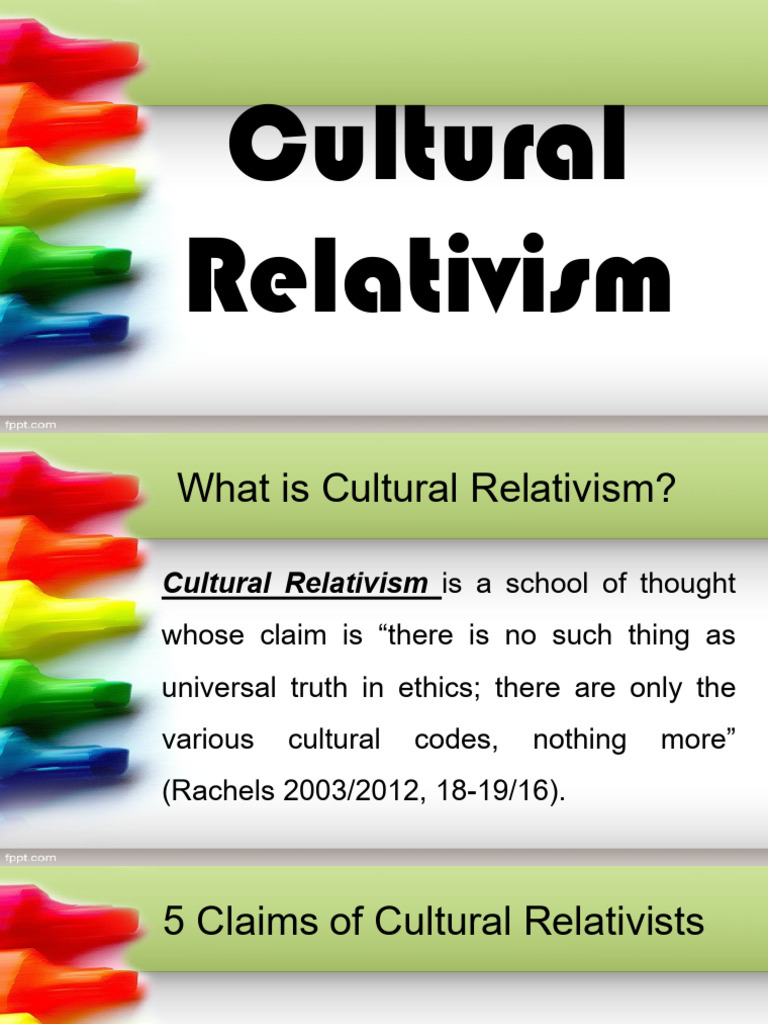Culture is like a vast tapestry, intricately woven with diverse threads of beliefs, practices, and values. Within this complex fabric lies a philosophical doctrine known as cultural relativism, which posits that one’s beliefs and practices should be understood based on that individual’s own culture rather than be judged against the criteria of another culture. As we delve into the principal premises of cultural relativism, we can better comprehend its significance in our increasingly interconnected world.
At its core, cultural relativism challenges the notion of universal moral standards. Rather than asserting that certain values or practices are superior—and consequently should be adopted by all—the framework insists that morality is a construct of societal norms. This perspective engenders a more profound appreciation for the rich variety of human experience. For instance, consider the practice of dietary restrictions. While some cultures may cherish certain foods as sacred, others may shun them. Cultural relativism enables us to understand these distinctions without imposing our own values upon them, thereby fostering a greater sense of empathy.
Another crucial premise of cultural relativism is the recognition of cultural diversity. This doctrine embraces the multitude of identities and lifestyles that envelop human existence, promoting an environment where differences are celebrated rather than condemned. The metaphor of a kaleidoscope aptly depicts this diversity; as one turns the lens, an array of colors and patterns emerge, each contributing to the overall beauty of the whole. In this metaphorical sense, each culture adds its unique hue to the rich tapestry of humanity.
One of the more contentious aspects of cultural relativism is its implications for ethical discourse. Critics argue that it can lead to moral nihilism, rendering any action defensible if it aligns with cultural norms. However, proponents contend that cultural relativism simply asks that we withhold judgment until we understand the context surrounding particular practices. For example, the custom of arranged marriages can be viewed as oppressive from a Western individualistic lens. Yet, when one considers the implications of communal ties and familial obligations that govern these unions in various societies, the practice might be appreciated as a means of preserving cultural integrity and social cohesion.
Furthermore, cultural relativism invites introspection regarding one’s own biases. In a world rife with globalization, our own cultural assumptions can blur our perception of other societies. To navigate this labyrinth of cultural nuances, one must adopt the perspective of an anthropologist—observing, listening, and striving to understand without the impediment of preconceived judgments. This approach not only enriches our worldview but potentially catalyzes cultural dialogue, fostering spaces wherein mutual understanding and respect can flourish.
Nevertheless, cultural relativism also navigates the treacherous waters of cultural imperialism. There is an inherent danger in dismissing the possibility of universally recognized human rights under the guise of cultural sensitivity. While it is essential to respect cultural variations, certain practices—such as female genital mutilation or honor killings—pose ethical dilemmas that deserve scrutiny regardless of cultural context. This conundrum over whether to uphold the sanctity of cultural practices or advocate for the protection of individual rights represents an ongoing philosophical tension.
Moreover, cultural relativism serves as a critique of ethnocentrism, which is the habit of judging other cultures solely by the values and standards of one’s own tradition. Ethnocentrism can lead to a distorted understanding of global dynamics, often resulting in the perpetuation of stereotypes and racism. Through the lens of cultural relativism, we are challenged to peel away the layers of ethnocentric bias and cultivate authentic intercultural dialogue, creating pathways that acknowledge both differences and connections. It lays the groundwork for a more harmonized global community wherein varied traditions enrich one another rather than clash.
The appeal of cultural relativism lies not only in its pursuit of understanding but also in its potential to evoke transformative change. Encouraging us to confront and challenge our own cultural presuppositions can lead to significant behavioral alterations. A more profound awareness of cultural differences can engender advocacy for social justice, broadening our horizons and pushing us to fight for the rights and dignity of all individuals, regardless of their cultural context. As we undertake this journey of understanding, the interplay between acceptance and critique becomes a vital compass guiding our ethical frameworks.
In conclusion, the principal premises of cultural relativism illuminate the complexities of human identity and morality. Through the lenses of cultural diversity, empathy, and ethical introspection, this doctrine challenges us to traverse the multifaceted landscape of human experience. It encourages a profound appreciation for the rich tapestry of culture, urging us to recognize that our experiences, while uniquely ours, represent just a fraction of the broader human narrative. As we continue to engage with cultures different from our own, cultural relativism serves as both a guiding principle and a reminder of the beauty contained within our differences.
